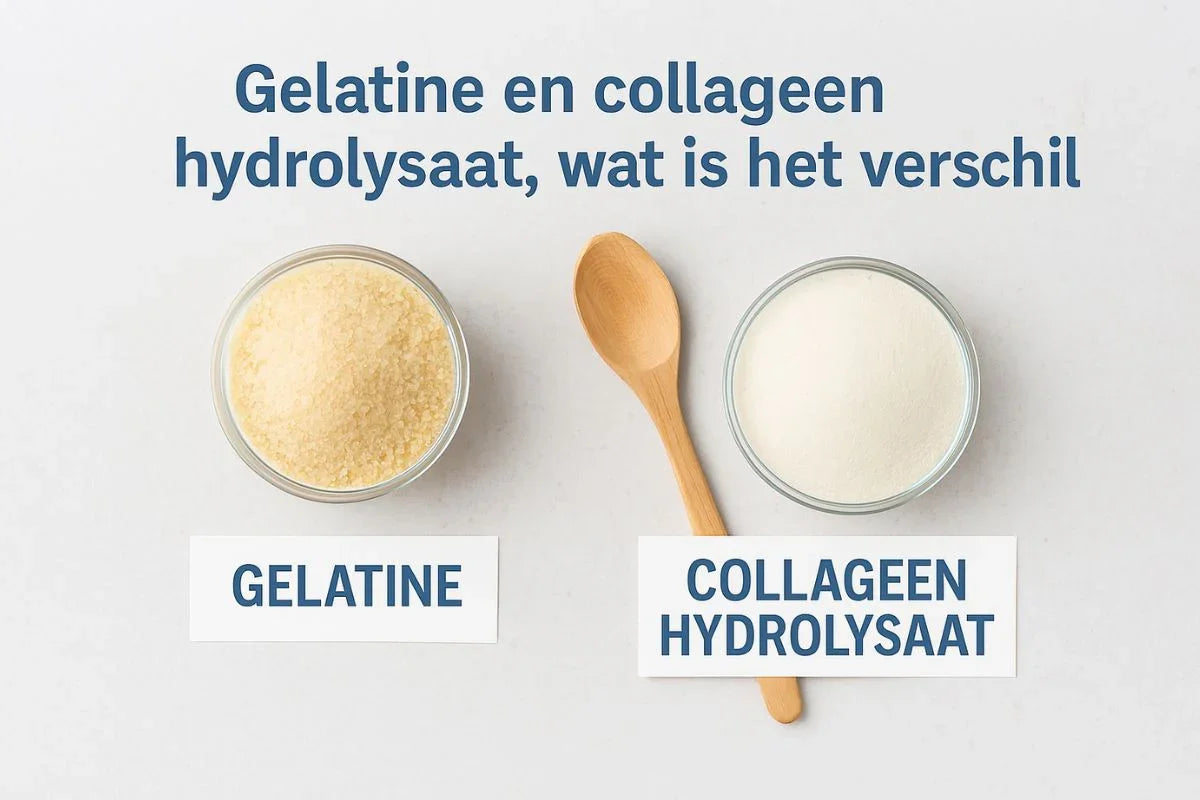
Gelatin and collagen hydrolysate: what's the difference?
Whey proteins have been popular as supplements worldwide for many years. They are widely used in shakes, bars, and smoothies to increase protein intake. But did you know that collagen hydrolysate is just as interesting as a protein source? This type of protein is unique due to its amino acid composition, which is particularly focused on supporting skin, hair, nails, joints, and connective tissue.
What is collagen and why is it important?
Collagen is the most abundant protein in the human body, accounting for about 25% to 35% of all proteins. It is a structural protein that plays a key role in the strength and integrity of skin, bones, cartilage, tendons, and blood vessels. As we age, natural collagen production decreases, which can lead to joint stiffness, loss of skin elasticity, and other signs of aging. Extra collagen through food or supplements may help counteract this decline.
Gelatin and Collagen Hydrolysate: What’s the difference?
Both gelatin and collagen hydrolysate are derived from animal collagen. The difference lies in processing and use:
- Gelatin is a partially hydrolyzed form of collagen obtained by cooking bones, skin, or fish. It is mainly used in desserts and recipes because it forms a gel-like structure in water.
- Collagen hydrolysate is fully hydrolyzed using enzymes, making it more soluble and easier for the body to absorb. It remains liquid at all temperatures and is ideal as a supplement in coffee, tea, smoothies, or juices.
Gelatin & Collagen Hydrolysate compared
| GELATIN | COLLAGEN HYDROLYSATE | |
|---|---|---|
| Sourced from | Bones, skin, and scales of animals (beef, pork, fish) | |
| Amino acid profile | Identical in both products | |
| Solubility | Only in warm or lukewarm water | Soluble in cold, lukewarm, and hot water |
| Reaction with water | Forms a gel / pudding | Stays liquid |
| Application | In recipes, desserts, soups | In drinks, shakes, smoothies, coffee |
Why choose collagen hydrolysate?
- Contains high concentrations of glycine, proline, and hydroxyproline – essential for connective tissue repair
- Easily dissolves, even in cold drinks
- No odor or taste – easy to mix without affecting flavor
- Supports skin elasticity, hair structure, and nail strength
- Sourced from sustainably caught fish (no factory farming)
Benefits of gelatin
- An excellent source of animal protein
- Particularly beneficial for the gut
- Helps create natural gel structures in food
- Has the same amino acid profile as collagen hydrolysate
Origin of our collagen
We consciously choose high-quality, ethical sources of collagen. Our collagen hydrolysate comes from wild-caught fish, which is not only more environmentally friendly but also free from antibiotics and other additives. We no longer use cod, due to population pressures from overfishing. The fish species we now use have the same amino acid profile, with small seasonal variations.
Ergomax gelatin: pure and responsible
Our gelatin comes from European grass-fed cattle and complies with strict EU regulations. The cattle are not kept in intensive farming systems, which is reflected in the quality of the final product. The gelatin is tasteless, neutral in smell, and rich in collagen-type proteins that are well absorbed. We guarantee a pure, clean, and reliable product.
Whether you choose gelatin or collagen hydrolysate – both can uniquely contribute to your health and well-being.

